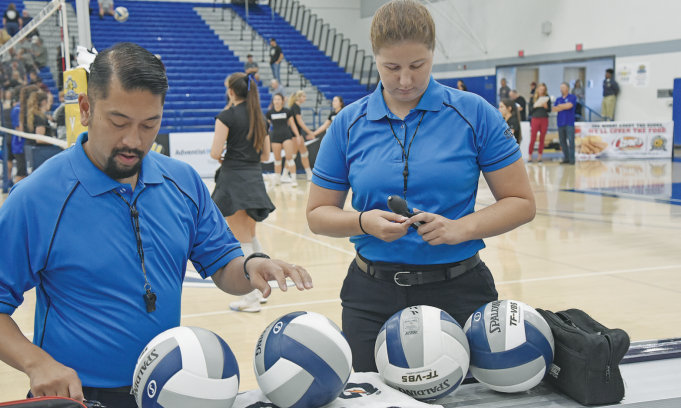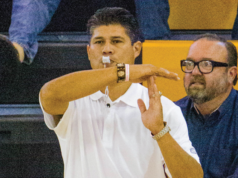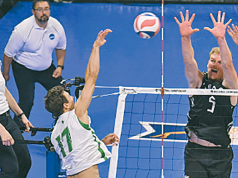It is important to arrive at a match with plenty of time to prepare yourself mentally as well as making sure to have enough time to conduct pre-match duties. Many officials have specific pre-match routines and would feel uncomfortable not having time to perform them. Not every volleyball match includes a pair of certified officials, but if it does, there are several ways the two officials can share the pre-match responsibilities to ease the stress of completing them as well as ensure they are done correctly. Here are several pre-match responsibilities that can be done as a team:
Checking equipment
One of the first things referees do when they enter a court is measure the height of the net as well as check the ball pressure. Sometimes, whoever is assigned as first referee will check the height of the net, antennas, cables and the referee stand. While the first referee is checking these, the second referee will find the game volleyballs to check their legality, condition and inflation. It is also a good time to make sure towels are available for the ball helpers and for the court if needed. In cases where the first referee is vertically challenged, the referees might switch checking equipment duties.
Playing surface, overhead clearance, and nonplaying areas
The old saying “two sets of eyes are better than one” is the perfect principle for completing these prematch duties. Officials can work together in identifying playing space, overhead obstacles, establishing ground rules, etc. This will ensure the officiating team is on the same page if a question comes up during the match.
Captain and coaches meeting
In high school, the head coach is a member of the team captains meeting. It is important to have both officials present to go over playable space and important details about the match. During the captains meeting, it is best practice for the first referee to offer the second referee the opportunity to relay any important information. In college and club matches, the coaches do not participate in the captains meeting. For collegiate matches, it is important both referees attend the meet and greet with the coaches. The first referee will usually go over specifics (who is serving, timeout length, whether or not there is media, intermission, etc.) and the second referee will hand the coach the lineup sheet and ask if the lineup needs to be protected. In club matches, the time is much shorter and a brief meet and greet is recommended if time permits.
Checking numbers on rosters (NFHS and USAV)
Officials can check rosters by themselves but most people will tell you it is easier when officials do this task together. Usually one official will read numbers while the partner is searching for the player. Both officials should make sure they have the correct number of players warming up as the number of players on the roster.
Checking uniforms
A bad feeling on the referee stand is when you have to do a double take at a player because you just realized the libero jersey is not contrasting. It is best to check this before the match begins and it is easier when the officials check this together. Healthy discussions on jersey compliance can help everyone be more consistent when judging uniform legality.
Talking to line judges and the table
The first referee will discuss techniques and preferences with the line judges before each match. The second referee will discuss preferences with the scorers’ table. Although these items are done separately, it is important the first referee and second referee share information about the briefing with each other if needed. For example, it can be helpful for the first referee to know if there is a novice scorer or a first-time libero tracker.
Lineup sheets and checking lineups
Whenever lineups are turned in by the coach, the scorer will write them in the correct spot on the score sheet. The second referee should work with the scorer to make sure the lineups are entered correctly. The scorer will return the favor for the second referee by double checking the starting lineups on the court while the second referee checks as well.
Ensuring court is ready for play
This should be a responsibility of the entire officiating crew. After warmups are complete, it is important everyone on the officiating team is ready to start the match. Some areas the officials may want to work together to finish pre-match responsibilities are:
In USAV season, the second referee and the scorers’ table workers should make sure all previous match material (i.e. lineups, libero sheets, etc.) is taken care of and food and drinks are removed from the table.
Ball shaggers should make sure all non-game balls are picked up and placed away from the court before the match begins. Line judges as well as referees should conduct a final scan to ensure all non-game balls are put away before the match begins.
Line judges in high school and college can help make sure antennas are aligned correctly before the match. Although the first referee checks this when the referees check the net height, sometimes the antennas move during warmups. The second check is typically done before the start of the national anthem. During a USAV match, a glance of the antennas can be done by both line judges and the first referee while walking to their positions.
All the above pre-match responsibilities could be performed by one referee (majority of USAV or youth matches) but if available, it is better to work with a partner to conduct these duties. By working together as a team, everything will be taken care of correctly before the match. This will also prevent having game-delaying situations during the match. As you get ready to referee your next volleyball match, be sure to share the pre-match responsibilities as extra pre-match care can prevent unnecessary, embarrassing issues.
Robert Doan, PhD, has been a high school, college and USAV official for more than a decade. He is a resident of Charleston County, S.C.
What's Your Call? Leave a Comment:
Note: This article is archival in nature. Rules, interpretations, mechanics, philosophies and other information may or may not be correct for the current year.
This article is the copyright of ©Referee Enterprises, Inc., and may not be republished in whole or in part online, in print or in any capacity without expressed written permission from Referee. The article is made available for educational use by individuals.


















